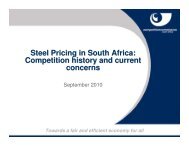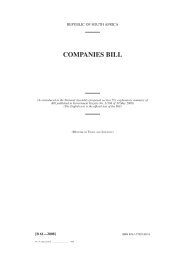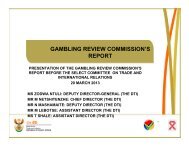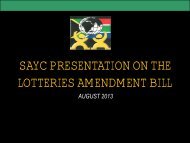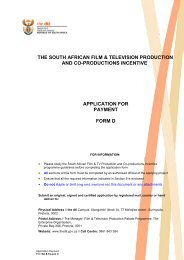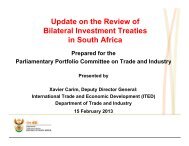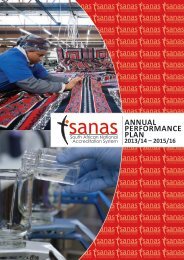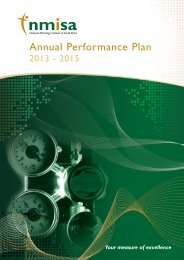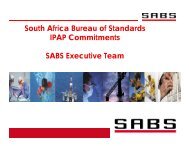Copyright Review Commission Report - ICT Law and Regulation ...
Copyright Review Commission Report - ICT Law and Regulation ...
Copyright Review Commission Report - ICT Law and Regulation ...
- No tags were found...
You also want an ePaper? Increase the reach of your titles
YUMPU automatically turns print PDFs into web optimized ePapers that Google loves.
12.3 COPYRIGHT IN MUSIC EDUCATION AND GENERAL PUBLIC AWARENESSDuring the course of public hearings <strong>and</strong> interaction with stakeholders, the CRC became aware of a general lack ofknowledge of copyright <strong>and</strong> its use in the music industry. Capacity building <strong>and</strong> the development of a knowledge basewould be a positive contributor to the growth of the industry.12.4 RECOMMENDATIONSThe dti should lead an intergovernmental committee in a renewed effort to consolidate past attempts to integrategovernment interventions in the music industry. A new Music Industry Task Team should be established to facilitategrowth <strong>and</strong> economic development. In this regard, players within the copyright regime should not be let off the hook. Allgovernment-sponsored efforts should be specified in terms of measureable outcomes <strong>and</strong> subject to monitoring <strong>and</strong>evaluation. Beneficiaries of sponsorship should be held accountable.12.4.1. At the level of WIPO, the dti has to ensure that its officials are informed of the developmental imperatives thatface the music industry <strong>and</strong> are able to represent the country effectively.12.4.2. All the recommendations of the MITT should be implemented with renewed vigour.12.4.3. Incentives by the South African Government for the production, marketing <strong>and</strong> export of South African musicneed to be intensified <strong>and</strong> exp<strong>and</strong>ed beyond the music industry hub of Johannesburg. This should be done bysponsoring, skilling <strong>and</strong> educating local independent producers in partnership with local government.12.4.4. The Department of Communications should be brought on board to take into account the effect of the newtechnologies on the music industry <strong>and</strong> play an effective part in the transition, <strong>and</strong> the promotion of access toknowledge <strong>and</strong> art.12.4.5. Collecting societies, particularly SAMRO, should adopt a developmental approach to membership recruitment,which may require that the society goes all out to recruit every active creator <strong>and</strong> performer in the country,viewing copyright not only as an individual right, but as a national resource empowered by national legislation.12.4.6. Collecting societies should adopt creative business practices by monitoring <strong>and</strong> adopting new local trends inmusic, <strong>and</strong> including these for membership recruitment <strong>and</strong> collection. For example, ABRAMUS in Brazilfocused on live concerts, gospel <strong>and</strong> country music as growth niches, while continuing the long-term battle ofgetting on board broadcasters <strong>and</strong> other infringers of copyrights. They have been able to show growth <strong>and</strong>provide monthly payments to members.12.4.7. The CRC recommends that schools <strong>and</strong> tertiary institutions involved with music education in particular <strong>and</strong> artsin general should be encouraged to develop unit st<strong>and</strong>ards <strong>and</strong>/or modules that deal with copyright issues intheir programmes. This should be done in collaboration with the South African Qualifications Authority. the dtishould engage the national Department of Education in this regard. Emphasis should be placed on developing aknowledge base in the following areas: <strong>Copyright</strong> as it relates to copyrighted music material, in tuition <strong>and</strong> in practice;- 89 -




